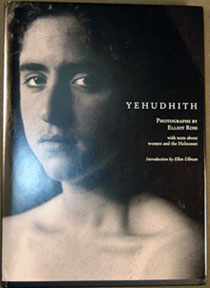Yehudhith: with texts about women and the Holocaust 11 x 8" with 105 pages. Black boards in black pictorial dust jacket. Signed on colophon by Elliott Ross. From the introduction by Ellen Ullman: "It is an odd way for a Jewish man to begin a book about the Holocaust: with a quote from Adolf Hitler. But so begins Elliot Ross's collection of photographs, with a picture of woman holding a violin and, facing her, a quote from "Mein Kampf" - Hitler musing (Horribly) about the Jews who had lived in Linz, Austria for centuries, becoming what Hitler calls "Europeanized," taking on "a human look," until, he says, "even I took them for Germans." And, indeed, the woman in Ross's photograph does look German. She is blond, fair-skinned, strong-chinned. The violin and bow she holds are veritable signifiers of high Mittel Europa culture at the turn of the last century. We can imagine her as the daughter of a prosperous burgher of Linz, the city that welcomed Hitler so joyously into its main square, our violin player posing for her portrait just before Herr Professor arrives for her music lesson. If she is a Jewish woman, we, like Hitler, cannot tell; there is nothing of the stereotyped Ashkenazi about her. As we look at her image, we're not certain what to think or feel, except discomfort. Who is she? It is only when we turn the page that we begin to understand the story Ross is about to tell in words and pictures. For the next photograph is an answer to the first, another woman, this one unmistakably Jewish (presumably one whom Hitler considered non-human in appearance.) She is strongly beautiful, almost Classically Semitic, something about her inviting the dangerous phase "beautiful Jewess." Yet we can't enjoy her beauty for long. For the text paired with this image, from the scholar Mary Lowenthal Felstiner, tells us the Nazi view of women: "cell-bearers," lowest ranking members of the low antirace of Jews, despised for having spawned it. Again we hear from Hitler: "Every child that a woman brings into the world is a battle, a battle waged for the existence of her people." And we begin to understand that we are about to get a very particular view of the Holocaust: as a battle over the bodies of women - mothers and potential mothers, as the Nazis saw them - the special horrors afforded them as living emblems of the survival of the Jewish people." |
